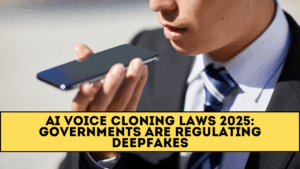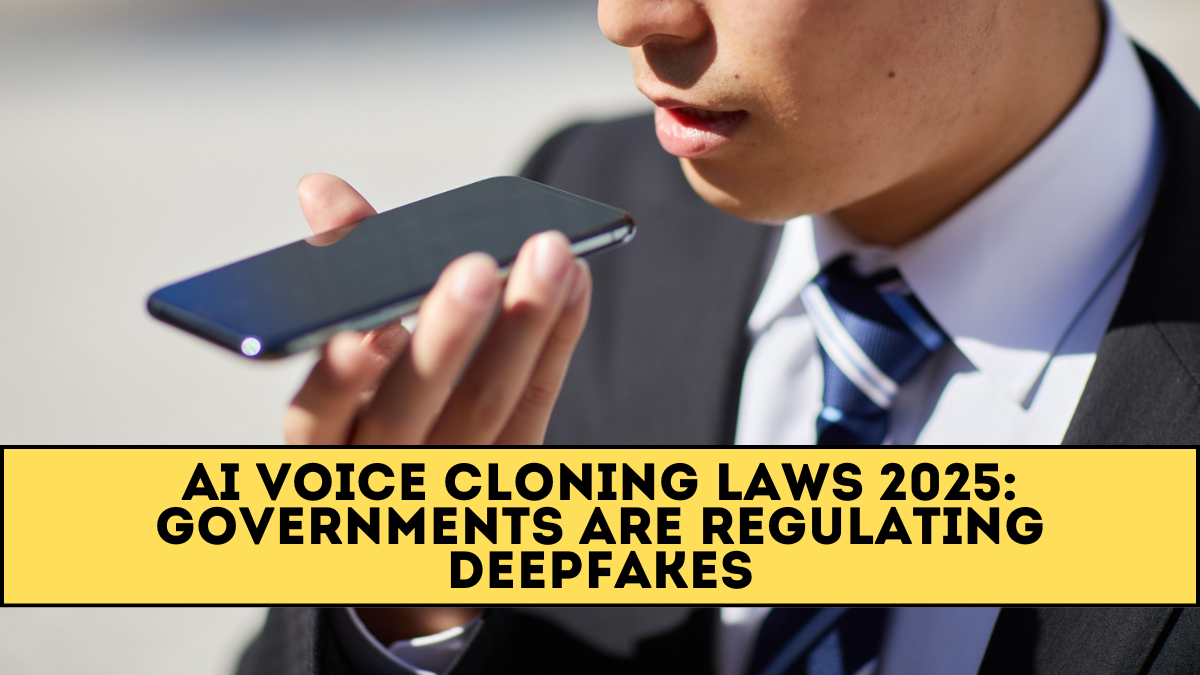AI voice cloning has rapidly become one of the most disruptive technologies of the decade. With the ability to recreate human voices with near-perfect accuracy, it offers exciting benefits but also introduces major risks related to fraud, identity theft, disinformation, harassment, and political manipulation. As a result, global authorities have begun enforcing AI Voice Laws 2025 to protect citizens, regulate emerging tools, and curb harmful misuse. These growing frameworks signal a turning point in how governments, institutions, and tech companies address deepfake regulations on a worldwide scale.

What Is AI Voice Cloning and Why It Needs Regulation
AI voice cloning uses machine learning to reproduce a person’s voice, tone, accent, and speaking style. While it supports accessibility tools, content creation, personalized assistants, and entertainment, it also makes impersonation crimes easier than ever. Authorities highlight rising cases where cloned voices were used for financial scams, ransom fraud, misinformation, and political disruptions. Because threats are evolving quickly, governments worldwide are updating policies under AI Voice Laws 2025 to strengthen privacy, authentication, and accountability frameworks.
How Governments Are Responding in 2025
Around the world, lawmakers have identified voice deepfakes as a national security concern and a consumer protection priority. The new AI Voice Laws 2025 often mandate that AI-generated speech includes clear disclosure notices, ensuring listeners understand when a voice is synthetic. Many regions are also rolling out stronger deepfake regulations requiring tech companies to monitor misuse, maintain audit trails, and block unauthorized voice cloning requests.
Regulations increasingly focus on:
-
Consent-based voice cloning
-
Legal penalties for impersonation
-
Mandatory watermarking or audio signatures
-
Data retention and transparency rules
-
Liability frameworks for developers and platforms
These rules help ensure that innovation continues while reducing risks to individuals and public institutions.
Consent and Ownership in AI Voice Laws 2025
One of the biggest shifts introduced by AI Voice Laws 2025 is the emphasis on explicit, verifiable consent. Governments now require that no one’s voice can be cloned, trained, or altered by AI systems without their permission. This includes celebrities, political leaders, business owners, and everyday citizens.
Ownership rights are also expanding, allowing individuals to take legal action against companies or people who generate unauthorized synthetic voice content. Such updates strengthen personal privacy protections and redefine digital identity governance under modern deepfake regulations.
Criminal Penalties and Misuse Prevention
To combat rising fraud and impersonation crimes, many countries are introducing new penalties for malicious use of AI-generated voice content. Offenses include impersonating someone for financial gain, spreading fake emergency messages, influencing elections, or creating deceptive audio recordings. Under AI Voice Laws 2025, punishment may involve heavy fines, imprisonment, or both, depending on severity.
Lawmakers aim to deter criminals without hindering legitimate AI development, striking a careful balance between innovation and public safety. This legal clarity helps businesses, creators, and researchers operate ethically within updated deepfake regulations.
Industry Responsibilities and Compliance Requirements
Governments are placing increased responsibility on AI developers and platforms to ensure safe deployment. Companies offering voice-cloning tools must conduct risk assessments, provide user identity verification, and restrict access to sensitive model features. Many AI Voice Laws 2025 also require AI systems to add detectable audio watermarks so that authorities can trace synthetic audio origins during investigations.
Compliance is now essential, and tech firms risk penalties if they fail to implement safeguards aligned with global deepfake regulations.
The Future of AI Voice Governance
As AI evolves, governments will continue adjusting frameworks to address emerging threats. While AI Voice Laws 2025 represent a major step forward, experts predict that regulations will expand further into election security, digital identity verification, and public communication standards. Ethical AI development will rely heavily on strong partnerships between policymakers, companies, and civil society.
These laws also mark the beginning of a global shift toward responsible innovation, helping ensure the benefits of voice AI outweigh its risks.
Conclusion
AI voice cloning technology delivers remarkable opportunities but also poses significant risks when misused. With rising incidents of scams, political interference, and privacy violations, governments worldwide have accelerated efforts to introduce comprehensive AI Voice Laws 2025 and enforce stronger deepfake regulations. These protections emphasize consent, transparency, and accountability to safeguard individuals and maintain public trust. As AI continues to advance, robust governance will remain essential to ensure this powerful technology is developed and applied responsibly.
FAQs
What are AI Voice Laws 2025?
AI Voice Laws 2025 are new regulations created to control the use of voice cloning tools, protect privacy, and prevent deepfake-related crimes.
Why are deepfake regulations important?
Deepfake regulations help governments manage risks such as impersonation, fraud, misinformation, and unauthorized voice cloning.
Can someone clone a voice without consent in 2025?
Most regions now require explicit permission before cloning a person’s voice, and unauthorized cloning can lead to legal penalties.
What penalties exist for voice deepfake misuse?
Penalties include fines, criminal charges, and imprisonment, depending on how the technology was misused.
How do companies comply with AI Voice Laws 2025?
Companies must verify user identity, add audio watermarks, provide transparency, and restrict harmful use of voice AI tools.
